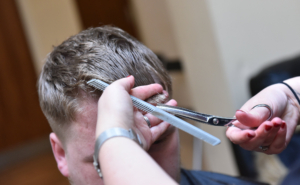How Access to Haircuts Empowers the Vulnerable
 In the complex landscape of socioeconomic disparities, the simple act of getting a haircut might seem inconsequential to many. However, for vulnerable populations in Brazil and beyond, access to haircuts can be a transformative tool in breaking down barriers and fostering empowerment. This article explores how initiatives providing haircuts to the vulnerable not only enhance physical well-being but also contribute to improved mental health, self-esteem and social integration.
In the complex landscape of socioeconomic disparities, the simple act of getting a haircut might seem inconsequential to many. However, for vulnerable populations in Brazil and beyond, access to haircuts can be a transformative tool in breaking down barriers and fostering empowerment. This article explores how initiatives providing haircuts to the vulnerable not only enhance physical well-being but also contribute to improved mental health, self-esteem and social integration.
The Power of a Haircut
Beyond the aesthetic aspects, self-grooming practices contribute significantly to a person’s overall well-being and sense of identity. Maintaining personal hygiene and appearance can boost self-esteem, fostering a positive self-image and confidence in one’s abilities. Personal hygiene and grooming, including haircuts, can significantly impact a homeless person’s ability to secure employment. In the competitive job market, first impressions matter, and a clean, well-groomed appearance signals professionalism and self-care.
Maintaining good personal hygiene demonstrates to potential employers that individuals value themselves and respect the workplace environment. Unfortunately, for those experiencing homelessness, access to regular grooming facilities may be limited, making it challenging to present themselves in the best light during job interviews. The lack of proper grooming can reinforce negative stereotypes and prejudices, potentially hindering their chances of employment.
Access to Haircuts and Mental Health
Homelessness often exacerbates mental health challenges, as the harsh realities of life on the streets or in unstable living conditions can lead to increased stress, anxiety and depression. The lack of a stable home environment and support systems can further impede access to mental health resources, creating a cycle that underscores the intricate relationship between homelessness and mental well-being.
The connection between appearance and mental health is also well-documented. For vulnerable individuals, the ability to maintain personal grooming routines, including regular haircuts, can have a profound impact on mental well-being. Feeling clean and presentable contributes to a positive self-image, boosting confidence and self-esteem.
Community-Based Initiatives in Brazil
Brazil has seen the emergence of several community-based initiatives addressing the grooming needs of vulnerable populations. One such initiative is run by Henrique Campos, a local barber co-owner of The Great Barber Shop, in São Paulo, who provides free haircuts to men with scheduled job interviews. Inspired by a friend’s need for a haircut before an interview, owner Henrique Campos decided to extend the offer to others in need. To avail themselves of the service, individuals only need to email evidence of their upcoming job interview.
Leandro Matias, a hairstylist from Votorantim, São Paulo, has also gained attention for offering free makeovers to boost the confidence of homeless individuals. He has helped over 30 homeless people by offering free makeover services.
This includes Bruno Henrique Cassimiro Ramos, 33. Leandro, who himself has been helping homeless people for over five years, emphasizes the emotional impact of the makeovers, often bringing clients to tears with gratitude. Bruno’s dramatic transformation, shared on social media, not only led to job offers for him but also garnered support from a dentist and local residents offering clothes and donations, indicating a positive turn in his life.
Access to haircuts might seem like a small step, but for vulnerable populations in Brazil, it can have an enormously transformative impact on empowerment and social inclusion. Initiatives providing grooming services go beyond the superficial, addressing fundamental aspects of well-being and identity.
– Genevieve Martin
Photo: Flickr
